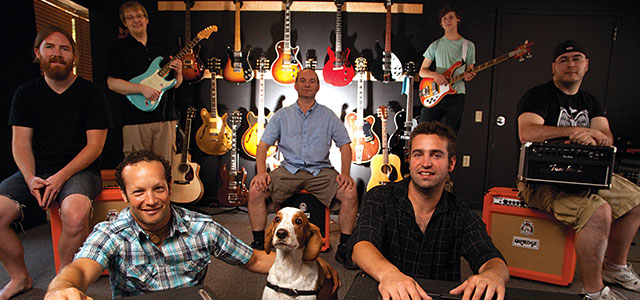
The shopping experience over the last decade has made a huge shift from Main St. to the computer screen, and even the smartphone app. So, it was only a matter of time before someone would merge the worlds of music making and online shopping in a way that was palatable to new and old players alike. Enter Music Store Live.
Ben Werlin, a graduate of the University of Miami and a jazz guitarist since the age of 15, was between jobs in 2010 when the opportunity came to join his brother Brandon’s business, which bought and sold gear on eBay. “Brandon wanted to hire someone to help with that business, and he asked me for advice on whom to hire,” Werlin said. “I started to give him some ideas, and then the light bulb went off: We should work together on this thing!” The brothers soon brought Ben’s longtime business associate, Jeff Santoro, into the fold. Then, things really started to take off.
As a player, Werlin himself had been skeptical of the process of buying gear over the Internet, and he used that to build a business model that, he said, “basically brings the guitar shop to your living room.” He continued, “In the past, I had felt that I didn’t want to buy a guitar online because the experience was so impersonal. So, with Music Store Live, we wanted to bridge that gap.”
The principal way that Werlin tries to replicate the brick-and-mortar customer experience is through his entire staff. Currently, Music Store Live employs eight people, all of whom are musicians, which allows them to contribute their unique knowledge of the gear to each product page and every aspect of the customer experience.
“We try to be very detailed, using descriptions written by actual players talking about how it plays and how it feels in their hands,” Werlin stated. “We use high-resolution photos, and we often make video demos to bring the gear on the screen to life. We’re also starting to host webcasts where we demo the gear live for our customers. It’s very interactive.”
Customers who visit Music Store Live will find mostly high-end instruments, as well as some mid-range products; custom orders, too, are always possible. It also, on occasion, has offered an exclusive model through brands like PRS Guitars. “I hand pick every PRS that we sell,” Werlin affirmed, “and we may go to the manufacturer and pick out woods and do a limited run.”
These days, the store mainly focuses on new instruments, stepping away from the used and vintage models that, in the early days, were Music Store Live’s bread and butter. “Selling new instruments was the better move, because we can rely on the manufacturers to stand behind their product,” Werlin explained. “The used instruments would often come in and not be as advertised, and we were taking on too much risk.” He continued, “We did get in some really cool vintage stuff that way, and it’s something we miss. However, it’s important to have the manufacturer’s stamp of approval on our gear.”
When stocking the online store, Werlin is open to customer suggestions and he’ll try to carry something if he gets enough requests for it. “We have nice metrics in place to see what has worked for us in the past, and there’s also an element of using your gut and getting instruments that you think your customers will want,” he said.
One of the benefits of having an online business, Werlin said, is being able to stock a deep catalog of inventory to cater to the needs of customers whom Music Store Live serves around the country. “Local dealers typically have a limited selection, but we’re able to carry a deeper inventory than a local market can support,” he said.
Music Store Live’s inventory can be found on Reverb, eBay, Amazon or Google Shopping, in addition to the store’s own Web site. No matter how a customer stumbled across a product, though, he or she can ask questions about any of the models Music Store Live sells. Personable sales associates are available by phone, by e-mail and via online chat.
“We take the time to talk with customers and answer their questions, and we go above and beyond to offer a great customer-service experience,” Werlin enthused. “This isn’t just a click-and-ship business.” In fact, he operates a small physical presence in the form of a by-appointment-only showroom. “We’ll bring out whatever item people want to play in person, but the showroom is a tiny component of the business,” Werlin noted. “We barely have people coming in.”
With a focus on the online customer also comes a generous return policy. “We offer free return shipping for store credit,” Werlin said. “If you try out an instrument and it isn’t a fit, the shipping is on us.”
Although some in the music products industry are not supportive of a shift to online retailing, Music Store Live has worked to gain the respect of many of its peers, including NAMM. The association gave the store its “Best Emerging Dealer” and “Best Marketing and Sales Promotion” dealer awards in 2014. Accolades such as those are an acknowledgement of where the industry is heading, as well as of the innovations Music Store Live is making to bring musical instrument shopping into the future while still maintaining the old-school aspects that customers know and love.
“A lot of the brick-and-mortar retailers are not happy that the business landscape has changed, but that was happening whether we were here or not,” Werlin said. “It’s the way commerce in general is going now.”
“What I love about our business,” Werlin continued, “is that it’s so creative and there is always something new we can be doing. We can’t have a physical space, but we can still interact with customers on a personal level, just as a regular music store would.”


